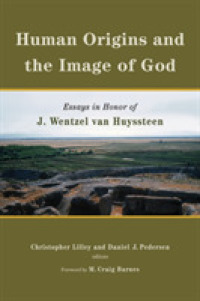- ホーム
- > 洋書
- > ドイツ書
- > Humanities, Arts & Music
- > Philosophy
- > general surveys & lexicons
基本説明
Offers a re-reading of the philosophies of Kant, Hegel, Heidegger, Kierkegaard, Nietzsche and Rosenzweig, arguing that within the structure of their thinking lies a notion of the absolute which can be recognised as 'philosophy's higher education'.
Full Description
Offers a re-reading of the philosophies of Kant, Hegel, Heidegger, Kierkegaard, Nietzsche and Rosenzweig. This book argues that within the structure of their thinking lies a notion of the absolute which can be recognised as philosophy's higher education. It argues that the dualisms have a speculative and therefore an educational significance.








